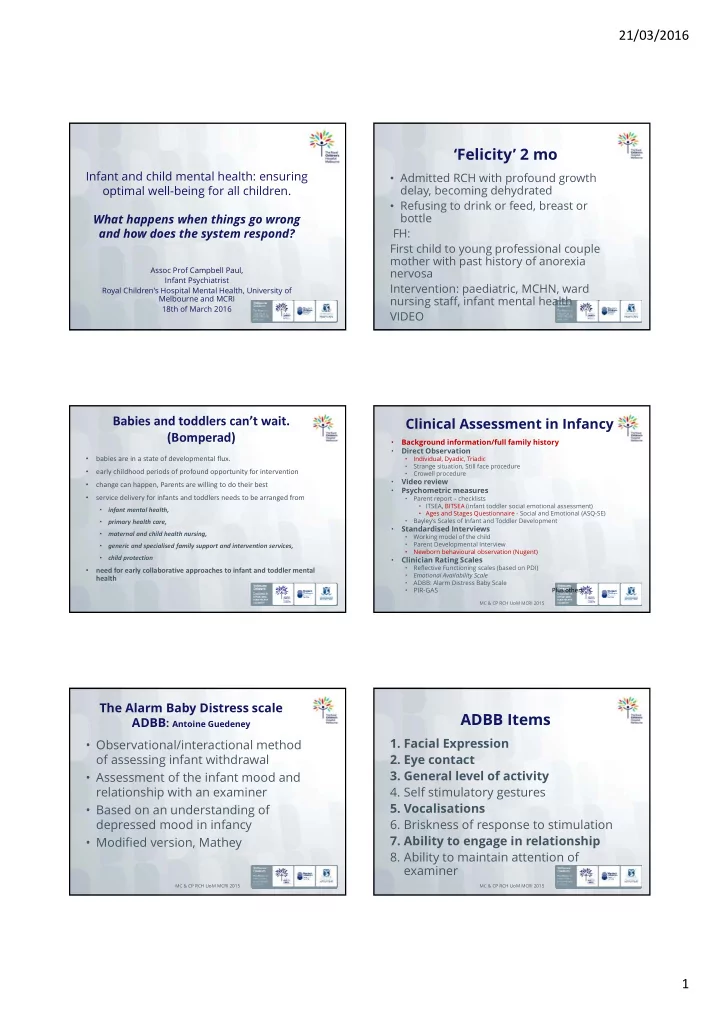

21/03/2016 ‘Felicity’ 2 mo Infant and child mental health: ensuring • Admitted RCH with profound growth optimal well-being for all children. delay, becoming dehydrated • Refusing to drink or feed, breast or bottle What happens when things go wrong and how does the system respond? FH: First child to young professional couple mother with past history of anorexia Assoc Prof Campbell Paul, nervosa Infant Psychiatrist Intervention: paediatric, MCHN, ward Royal Children's Hospital Mental Health, University of Melbourne and MCRI nursing staff, infant mental health 18th of March 2016 VIDEO Babies and toddlers can’t wait. Clinical Assessment in Infancy (Bomperad) • Background information/full family history • Direct Observation • Individual, Dyadic, Triadic • babies are in a state of developmental flux. • Strange situation, Still face procedure • early childhood periods of profound opportunity for intervention • Crowell procedure • Video review • change can happen, Parents are willing to do their best • Psychometric measures • service delivery for infants and toddlers needs to be arranged from • Parent report – checklists • ITSEA, BITSEA (infant toddler social emotional assessment) • infant mental health, • Ages and Stages Questionnaire - Social and Emotional (ASQ-SE) • Bayley’s Scales of Infant and Toddler Development primary health care, • • Standardised Interviews • maternal and child health nursing, • Working model of the child • Parent Developmental Interview • generic and specialised family support and intervention services, • Newborn behavioural observation (Nugent) • child protection • Clinician Rating Scales • Reflective Functioning scales (based on PDI) • need for early collaborative approaches to infant and toddler mental • Emotional Availability Scale health • ADBB: Alarm Distress Baby Scale • PIR-GAS Plus others..... MC & CP RCH UoM MCRI 2015 The Alarm Baby Distress scale ADBB Items ADBB : Antoine Guedeney 1. Facial Expression • Observational/interactional method of assessing infant withdrawal 2. Eye contact 3. General level of activity • Assessment of the infant mood and relationship with an examiner 4. Self stimulatory gestures 5. Vocalisations • Based on an understanding of depressed mood in infancy 6. Briskness of response to stimulation 7. Ability to engage in relationship • Modified version, Mathey 8. Ability to maintain attention of examiner MC & CP RCH UoM MCRI 2015 MC & CP RCH UoM MCRI 2015 1
21/03/2016 Newborn response to still face What is Infant Mental Health? paradigm : Nagy 2008 • Early relationships have permanent effects on brain development, health and later mental health BRIEF REPORTS • Social emotional and physical health are Innate Intersubjectivity: Newborns’ Sensitivity inseparable to Communication Disturbance • The baby is a person with a mind Emese Nagy • Responsive caregiving can mediate the effects University of Dundee In most of our social life we communicate and relate to others. Successful interpersonal relating is crucial of chronic problems: poverty, prematurity to physical and mental well-being and growth. This study, using the still-face paradigm, demonstrates • Intervention can be effective for the infant’s that even human neonates ( n _ 90, 3–96 hr after birth) adjust their behavior according to the social responsiveness of their interaction partner. If the interaction partner becomes unresponsive, newborns emotional, social, physical development will also change their behavior, decrease eye contact, and display signs of distress. Even after the interaction partner resumes responsiveness, the effects of the communication disturbance persist as a • Babies can be traumatised by disruption of spillover. These results indicate that even newborn infants sensitively monitor the behavior of others and attachment relationships, witnessing violence react as if they had innate expectations regarding rules of interpersonal interaction. Keywords: neonate, still-face, interaction, intersubjectivity as well as direct physical violence Developmental Psychology 2008, Vol. 44, No. 6, 1779–1784 Infant and Preschool Mental Mental health problems occur Health across any age Egger & Aingold • Who works with the infant and the family? • Therapeutic intervention can occur in any setting… • Key Concepts • Baby has a mind • Parental Reflective capacity.. mentalizing • [THERAPIST REFLECTIVE CAPACITY] • We have a responsibility to engage the infant and parents • Developmental transactional models • Behaviour has meaning Babies and toddlers do have mental health problems Helen Egger 2006 J Ch Psycol Psych Few large scale epidemiological surveys of “Review highlights how early we are in mental health problems and infants and toddlers the process of characterising the • BITSEA (Brief Infant Toddler Social nosology and epidemiology of Emotional Assessment) preschool behavioural and emotional 10.4% of infant’s aged 12 to 36 months were disorders, particularly depression and judged to be in the “of concern range” for social emotional development/behaviour anxiety disorders.… problems. How late we are in recognising the • There was a high correlation with distress and impairment of preschool mental health problems aged 6 children and their families ”. commencing primary school: • The early detected problems were largely ones which endured into primary school 21/03/2016 CP RCH UoM Briggs-Gowan and Carter(2008 ) 12 • 2
Recommend
More recommend